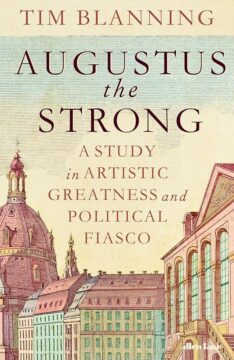Ritchie Robertson at Literary Review:
 Unsuccessful in politics and war, Augustus turned to culture. He transformed Dresden into a city which, even after the notorious bombing raid of February 1945, is still handsome. The highlights include the Zwinger, a palace complex that served as a setting for festivities, the Frauenkirche and the 437-metre-long Augustus Bridge, which linked the centre with the New Town on the other side of the Elbe, helping to create an integrated urban landscape. Next door to the Zwinger, Augustus built the largest opera house in Germany. Blanning enthuses about his success in attracting architects, artists and musicians to Saxony, the most famous being Johann Sebastian Bach, who arrived in Leipzig, Saxony’s other main city, in 1723.
Unsuccessful in politics and war, Augustus turned to culture. He transformed Dresden into a city which, even after the notorious bombing raid of February 1945, is still handsome. The highlights include the Zwinger, a palace complex that served as a setting for festivities, the Frauenkirche and the 437-metre-long Augustus Bridge, which linked the centre with the New Town on the other side of the Elbe, helping to create an integrated urban landscape. Next door to the Zwinger, Augustus built the largest opera house in Germany. Blanning enthuses about his success in attracting architects, artists and musicians to Saxony, the most famous being Johann Sebastian Bach, who arrived in Leipzig, Saxony’s other main city, in 1723.
Augustus was determined to outshine other Baroque rulers in the scale and splendour of the festivities he staged. In 1719, his only legitimate son, Frederick Augustus, married Archduchess Maria Josepha of Austria, daughter of the recently deceased Emperor Joseph I.
more here.
Enjoying the content on 3QD? Help keep us going by donating now.
